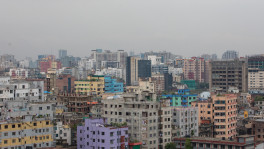Uttarsury: Remembering the ideals, and the people, that brought us here
A new cultural centre aims to preserve the progressive cultural values of the pre-Liberation War generations for future generations

An inability to contextualise history, to interpret our tradition and an inability to find pride in culture can create partial consciousness of what and who we are. This keeps people artificially divided and culturally incomplete.
An old residential house in Dhanmondi, which has recently become a new cultural centre, aims to become a repository for the young generation from where they can develop a full consciousness of where they come from.
Currently, the centre offers visitors photographs taken by the late Bangladeshi photographer and Ekushey Padak recipient Manzoor Alam Beg, artwork and installation by contemporary artists and furniture that belonged to the Bangladeshi intellectual couple - Khan Sarwar Murshid and Nurjahan Murshid. After all, the centre was formerly the couple's residence.
One may ask why this centre is important?
Distinct from both West Bengal and Pakistan, Bangladeshi culture evolved from its own struggles. The post-partition East Pakistan of the 1950s and 1960s saw the emergence of a dynamic, creative and emancipated generation of Bangalee pioneers who laid down the foundation of our nation, and whose work enlightened our society, eventually leading to the creation of Bangladesh.

And two such individuals among those pioneers were Khan Sarwar Murshid (a Bangladeshi educationist, diplomat and intellectual) and Nurjahan Murshid (a journalist, teacher and social activist). The couple married in 1948 and were part of a generation of young intellectuals, cultural activists and socio-political thinkers who gave people a vision for a new society based on social justice and a secular state order, one that was not based on religion but rooted in reason.
Today, the teachings of that generation are slowly fading. And as we lose sight of the legacy left behind by our forefathers, society seems to be at risk of slipping into an abyss of moral chaos, and religious and nationalist extremism.
Uttarsury's - inaugurated on 1 July - mission is to give back the dream of a humane society to the youth of Bangladesh; and it is dedicated to Khan Sarwar Murshid and Nurjahan Murshid.
The centre, Uttarsury: Noorjehan-Sarwar Mushid Cultural Centre, was started by the couple's youngest daughter Sharmeen Murshid.
"Uttarsury means inheritance. We have inherited two massive archives. One is of Late Manzoor Alam Beg and the other was from the Murshid family," said Mustafa Zaman, artist, writer and director of Uttarsury.
"These archives include photographs by Beg Sir, who is considered one of the top Bangalee photographers. The family archive includes a vast art collection, various journals and letters, and published and unpublished works.
The intellectual contribution of Khan Sarwar Murshid is widely known by the academic community, many of whom were his students who studied at Dhaka University's English Department or knew him from the time he served as a Vice Chancellor at Rajshahi University.

However, the media had not written that much about his contribution during the Six-point Movement, or the intellectual contributions he made when he was with Bangabandhu Sheikh Mujibur Rahman. These works did not reach the masses as much as they should have," he added.
Illustrious minds
Khan Sarwar Murshid was an academician, diplomat and intellectual. He was a Professor of the English Department at Dhaka University, and later served as Vice Chancellor at Rajshahi University. During his tenure as a diplomat, he served as the Bangladeshi High Commissioner to Poland, Hungary and Czechoslovakia. He was appointed Assistant Secretary General to the Commonwealth Secretariat, and was the first Chairman of the Bangladeshi branch of Transparency International, where Murshid served as a Trustee until his death.
Meanwhile, Noorjehan Murshid belonged to a small group of educated middle-class women in pre-partition East Bengal who began to be inspired by changes in society. A women's movement was born out of the resistance against British rule and women such as Renuka Ray, Hamida Ali, Shayesta Ekramullah, Sufia Kamal, Anowara Khatun and many others left a profound mark on the minds of the first post-partition generation. These women were breaking taboos and getting into public life, setting progressive cultural roles for themselves. They entered the field of politics, social activism and education.
Noorjehan and other like-minded women were in the mainstream of society, breaking barriers and making headway in a conservative Muslim society. She noted in her memoir, "We have walked the path paved by Begum Rokeya. and the coming generation will walk the path that we leave behind."
Noorjehan was a journalist, teacher and politician. She was a broadcaster for All India Radio, notably, the first Muslim woman to work there. In East Pakistan, Murshid continued to work in the media, broadcasting for Radio Pakistan and eventually becoming a programme producer.

She was one of two women to be directly elected to the Provincial Legislative Assembly of East Bengal in 1954 on a United Front ticket. As an accredited deputy of the Mujibnagar Government in exile, she sought the recognition of Bangladesh from the Indian government to raise support for the Bangladesh Liberation War.
After Bangladesh's independence, she was appointed in 1972 as State Minister for Health and Social Welfare in the cabinet of Bangabandhu Sheikh Mujibur Rahman. She was also elected to the country's first parliament in 1973.
She was also the Editor of Edesh Ekal, a periodical which focused on the problems of women, and explored various social and political issues that confronted Bangladesh. Noorjehan was the first President of the Bangladesh Mahila Samity, a founder member of Birdem Diabetic Clinic, and a sponsor of Ain-o-Shalish Kendra at its infancy.
"The people Khan Sarwar Murshid and Noorjehan Murshid primarily associated with were people of culture and women's rights activists, that is why our areas of interests are academic research, all facets of arts – including art, music, dance theatre, photography and literature – and the women rights," said Zaman.
"Uttarsury will highlight the works of social-political thinkers, academics, writers and artists; people who redefined the social and political values," added Zaman.
Restoring lost knowledge
A big part of Uttarsury's work involves working with archives for the restoration of lost knowledge. Uttarsury also plans to collect and archive the works of key political, cultural and academic figures for the future generations.
"People in Bangladesh don't always understand the value of an archive. As a result, knowledge and wisdom imparted by key personalities from recent history are being lost. There are many people in Bangladesh who have had great contributions to our country, but there is no one place where you can find out about all of their works.
Take photography for example, there is no place in the country where you can find the works of all of our distinguished photographers. The important photos from our history, from during the Liberation War, there is no single archive for it," said Imtiaz Alam Beg, renowned photographer, Director of Begart Institute of Photography and Executive Director of Uttarsury.

Uttarsury will give out two Annual Research Awards, named after the couple, where gender perspectives and analysis will serve as an important point of departure. It will stage public discourses to bring to light the enlightened period of the 1950s and 1960s, to address issues concerning identities and existential realities. They also plan to collaborate and partner with academic and cultural institutions, both private and public, in the future.
"Creating an archive will prevent knowledge from being lost in time and allow for research. Khan Sarwar Murshid and Noorjehan Murshid were widely known and respected by intellectuals in Bangladesh, so whenever we approach people and organisations for access to their personal archives, they are willing to help.
We want our archive to be accessible for all in a virtual museum. This will encourage and allow research into our past, and we can finally break the schism between the present generation and the teachings of our forefathers," added Mustafa Zaman.


 Keep updated, follow The Business Standard's Google news channel
Keep updated, follow The Business Standard's Google news channel















